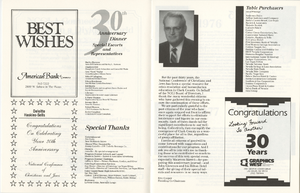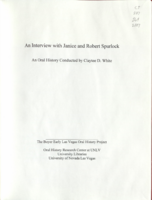Search the Special Collections and Archives Portal
Search Results

Program for 30th Anniversary Dinner event for the Southern Nevada Chapter of the National Conference of Christians and Jews, 1988
Date
Archival Collection
Description
The program for the 30th anniversary dinner for NCCJ includes dedications and highlights of the Southern Nevada Chapter.
Text

Transcript of interview with Alice Thiriot Waite by Carole Terry and Donna Andress, October 19, 2011
Date
Archival Collection
Description
The memories and recollections of Alice Thiriot Ballard Waite provide a most interesting look at both at the Junior League of Las Vegas in the 1970s and the early days of Las Vegas. Alice recalls her childhood and young adult years after she arrived in Las Vegas at the age of five, giving the reader a rare picture of Las Vegas in the 1950s and 1960s. She was most active in the volunteer community of Las Vegas and served as Junior League President in 1964-5. Her reminiscences about the events and activities during the years while she was a Junior League member are an invaluable insight into its history. The exhibits she is sharing are an important documentation of those years after the Service League became the Junior League. She herself was a forerunner of today's Active members because she was a single, working mother while serving as the first "professional" President of the League.
Text

Gustavo Ramos Jr. interview, October 25, 2018: transcript
Date
Archival Collection
Description
Interviewed by Laurents Bañuelos-Benitez. Gustavo Ramos Junior was born in Presidio, Texas. Growing up Ramos described his childhood as simple childhood, typical of someone that was born on farmland. At the age 10, Ramos and his family moved to California in hopes of better opportunities. When they arrived in California the family had to live in public housing, despite his father not wanting to, he realized it was the only way his family could start anew. Living in public housing influenced Ramos for the rest of his life, including his career as director of public housing in three states.
Text

Transcript of interview with Janice and Robert Spurlock by Claytee White, June 17, 2010
Date
Archival Collection
Description
Janice and Robert Spurlock were married in 1990 and each has a lifetime of Las Vegas memories. They have made Sandy Valley home for nearly 32 years. Together the couple recalls the people and places of Las Vegas' past from their points of view during this oral history interview. For Janice the stories begin in the 1930s after her family moved to Las Vegas from California. She was a youngster of about five. Among the topics she talks about is walking to Fifth Street Grammar School, graduating from Vegas High School, and fun had during Helldorado Days. In 1953, Robert arrived. He was a young man headed from Arizona to Colorado seeking work as a welder. He stopped in Henderson, Nevada and never quite made it out of the area. For the next two decades he worked construction and helped build many local landmarks. He shares stories about the range wars and about being accidentally exposed to radiation from the Nevada Test site.
Text

LeMoyne Legere interview, March 17, 1977: transcript
Date
Archival Collection
Description
On March 17, 1977, collector Cecilia Branch interviewed LeMoyne Legere (born in 1935) at her residence in Las Vegas, Nevada. In this interview, Mrs. Legere discusses various differences in Las Vegas from the time she was growing up to the date of the interview. She also discusses her involvement in high school and what people do for recreation.
Text

Transcript of interview with Justice Michael Cherry by Barbara Tabach, September 19, 2014
Date
Archival Collection
Description
Interview with Justice Michael Cherry by Barbara Tabach on September 19, 2014. In this interview, Justice Cherry talks about how he came to Las Vegas and his work as a public defender and as a lawyer in private practice. He also discusses his involvement with Jewish organizations in various capacities, and his involvement with high-profile cases such as the MGM Grand and Las Vegas Hilton fires, earning him the nickname "master of disaster."
Justice Michael Cherry was born in St. Louis, Missouri, and went on to spend his childhood in the Jewish neighborhood of University City. He attended University of Missouri and became a leader in his fraternity, Alpha Epsilon Pi, and a committed ROTC cadet. By the time Justice Cherry graduated from Missouri and was heading to Washington University School of Law, he was a second lieutenant; halfway through law school, he was promoted to first lieutenant. It was also during law school that he married his college sweetheart, Rachel Wolfson. When a bad back prevented him from becoming an active air force officer, he and his wife decided to follow his mother to Las Vegas. Justice Cherry worked both as a law clerk with the Public Defender's Office as well as a security guard at Wonder World when he first moved to the city. After passing the Nevada bar, Cherry took at position with the Public Defender's Office, and later went into private practice as a successful criminal defense attorney. Cherry was elected as district judge in 1998 and 2002. In 2006, he won his campaign for state Supreme Court justice. Justice Cherry was reelected to office in 2012 for another four-year term. He is currently the highest-positioned Jewish official in the state of Nevada. Throughout his years in Las Vegas, Justice Cherry has been an extremely active and influential member of the Jewish community and served as chairman of the Anti-Defamation League and is active in the Jewish Federation. Justice Cherry attributes his commitment to service to his mother. In addition to his service to the Jewish community, he has been active in numerous other service organizations, including March of Dimes, Olive Crest, Adoption Exchange and American Cancer Society.
Text

Transcript of interview with Joseph Thiriot by Claytee White, August 10, 2000
Date
Archival Collection
Description
Joseph Thiriot is a longtime Las Vegas resident who served the community as an educator. He was born in 1906 in Provo, Utah; one of five sons bom to George W. and Elvira Thiriot. He has vivid memories of moving about, including living in Idaho where his father sold a typing machine , a forerunner to the typewriter. Eventually the family moved to a ranch in Pahranagat Valley, Nevada, where the limits of educational opportunities compelled his paients to send him back to Provo to finish his education while living with family there. Gaining a teaching certificate enabled Joseph to teach in rural Nevada. He completed his degree at the University of Utah and after meeting Las Vegas Superintendent Maude Frazier he relocated to Las Vegas to become a teacher. He reminisces about his life and the changes that have occurred over the years in Las Vegas.
Text

Hernando Amaya oral history interview: transcript
Date
Archival Collection
Description
Oral history interview with Hernando Amaya conducted by Laurents Banuelos-Benitez, Marcela Rodriguez-Campo, and Barbara Tabach on October 18, 2018 and December 3, 2018 for the Latinx Voices of Southern Nevada Oral History Project. In this interview, Hernando Amaya talks about his childhood and education in Bogota, Colombia. He discusses his start in journalism as a young man and working for El Espectador, the Colombian national newspaper. He discusses his experiences reporting on the narco-terrorism occurring in Medellin, Colombia and how this eventually led to his immigration to the United States. Amaya moved to Las Vegas, Nevada in 2001 and continued his career in journalism by working for local Spanish speaking papers and websites. He relates his civic involvement in the Las Vegas area, his work as the president of the Colombian Association of Las Vegas, and various other civic engagements. As a journalist, he asserts the importance of knowing one's culture, storytelling, learning history, and being active in the community.
Text

Maria Benítez oral history interview: transcript
Date
Archival Collection
Description
Oral history interview with Maria Benítez conducted by Monserrath Hernández and Maribel Estrada Calderón on June 21, 2019 for the Latinx Voices of Southern Nevada Oral History Project. Maria Benítez is the image of a hardworking and determined Salvadoran woman. After facing adversity amidst the Salvadorian Civil War she talks about her journey as a nurse in El Salvador and migrating to the United States. Here in Las Vegas, she has worked as a cook on the Strip, been an active member of her church, and supported the education of her children selling pupusas. Subjects discussed include: El Salvador, Salvadorian Civil War, Migration, US Citizenship Documentation, and Judaism.
Text

Transcript of interview with Christie Young by Dennis McBride, October 18, 1998
Date
Archival Collection
Description
I've known Christie Young for many years and was grateful she agreed to be interviewed for the Las Vegas Gay Archives Oral History Project. Not only is she frank in what she says, but her background as a researcher in sexual issues and as a straight woman involved in the gay community give her a unique perspective. Ancillary to her donation of this interview transcript to the University of Nevada, Las Vegas, Christie has generously donated her personal journals which detail more than a decade of her life including the years she worked with Las Vegas's gay community . Christie shares the project's concern that documentation of the gay community is ephemeral and vanishes rapidly; her determination that her contribution to that community be preserved greatly enriches our knowledge and will benefit future scholars.
Text
